Producten
-
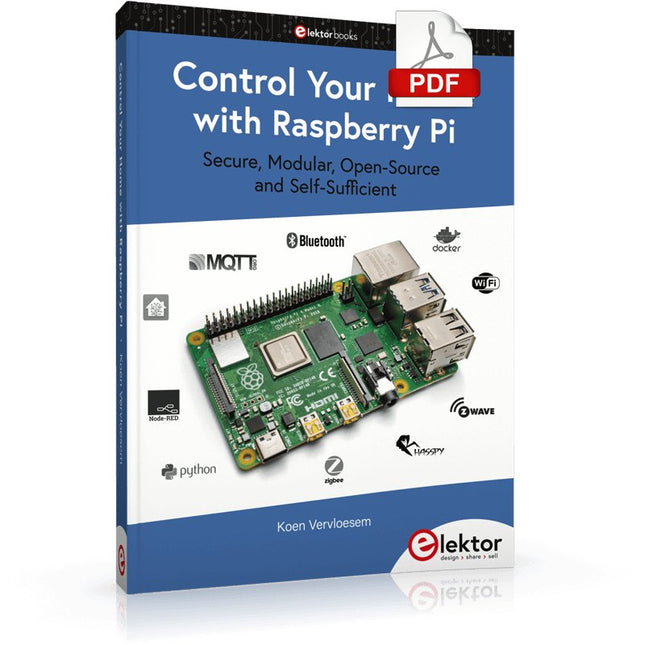
Elektor Digital Control Your Home with Raspberry Pi (E-book)
Secure, Modular, Open-Source and Self-Sufficient Ever since the Raspberry Pi was introduced, it has been used by enthusiasts to automate their homes. The Raspberry Pi is a powerful computer in a small package, with lots of interfacing options to control various devices. This book shows you how you can automate your home with a Raspberry Pi. You’ll learn how to use various wireless protocols for home automation, such as Bluetooth, 433.92 MHz radio waves, Z-Wave, and Zigbee. Soon you’ll automate your home with Python, Node-RED, and Home Assistant, and you’ll even be able to speak to your home automation system. All this is done securely, with a modular system, completely open-source, without relying on third-party services. You’re in control of your home, and no one else. At the end of this book, you can install and configure your Raspberry Pi as a highly flexible home automation gateway for protocols of your choice, and link various services with MQTT to make it your own system. This DIY (do it yourself) approach is a bit more laborious than just installing an off-the-shelf home automation system, but in the process, you can learn a lot, and in the end, you know exactly what’s running your house and how to tweak it. This is why you were interested in the Raspberry Pi in the first place, right? Turn your Raspberry Pi into a reliable gateway for various home automation protocols. Make your home automation setup reproducible with Docker Compose. Secure all your network communication with TLS. Create a video surveillance system for your home. Automate your home with Python, Node-RED, Home Assistant and AppDaemon. Securely access your home automation dashboard from remote locations. Use fully offline voice commands in your own language. Download the software and view the errata for the book on GitHub.
€ 34,95
Leden € 27,96
-

Elektor Digital Controller Area Network Projects (E-book)
The Controller Area Network (CAN) was originally developed to be used as a vehicle data bus system in passenger cars. Today, CAN controllers are available from over 20 manufacturers, and CAN is finding applications in other fields, such as medical, aerospace, process control, automation, and so on. This book is written for students, for practising engineers, for hobbyists, and for everyone else who may be interested to learn more about the CAN bus and its applications. The aim of this book is to teach you the basic principles of CAN networks and in addition the development of microcontroller based projects using the CAN bus. In summary, this book enables the reader to: Learn the theory of the CAN bus used in automotive industry Learn the principles, operation, and programming of microcontrollers Design complete microcontroller based projects using the C language Develop complete real CAN bus projects using microcontrollers Learn the principles of OBD systems used to debug vehicle electronics You will learn how to design microcontroller based CAN bus nodes, build a CAN bus, develop high-level programs, and then exchange data in real-time over the bus. You will also learn how to build microcontroller hardware and interface it to LEDs, LCDs, and A/D converters. The book assumes that the reader has some knowledge on basic electronics. Knowledge of the C programming language will be useful in later chapters of the book, and familiarity with at least one member of the PIC series of microcontrollers will be an advantage, especially if the reader intends to develop microcontroller based projects using the CAN bus.
€ 29,95
Leden € 23,96
-

Elektor Digital Controller Area Network Projects with ARM and Arduino (E-book)
This book details the use of the ARM Cortex-M family of processors and the Arduino Uno in practical CAN bus based projects. Inside, it gives a detailed introduction to the architecture of the Cortex-M family whilst providing examples of popular hardware and software development kits. Using these kits helps to simplify the embedded design cycle considerably and makes it easier to develop, debug, and test a CAN bus based project. The architecture of the highly popular ARM Cortex-M processor STM32F407VGT6 is described at a high level by considering its various modules. In addition, the use of the mikroC Pro for ARM and Arduino Uno CAN bus library of functions are described in detail. This book is written for students, for practising engineers, for hobbyists, and for everyone else who may need to learn more about the CAN bus and its applications. The book assumes that the reader has some knowledge of basic electronics. Knowledge of the C programming language will be useful in later chapters of the book, and familiarity with at least one microcontroller will be an advantage, especially if the reader intends to develop microcontroller based projects using CAN bus. The book should be useful source of reference to anyone interested in finding an answer to one or more of the following questions: What bus systems are available for the automotive industry? What are the principles of the CAN bus? What types of frames (or data packets) are available in a CAN bus system? How can errors be detected in a CAN bus system and how reliable is a CAN bus system? What types of CAN bus controllers are there? What are the advantages of the ARM Cortex-M microcontrollers? How can one create a CAN bus project using an ARM microcontroller? How can one create a CAN bus project using an Arduino microcontroller? How can one monitor data on the CAN bus?
€ 32,95
Leden € 26,36
-

Elecrow CrowBot BOLT – Smart Robot Car Kit (met Joystick)
CrowBot BOLT is an ESP32-controlled, intelligent, simple and easy-to-use open source robot car. It is compatible with the Arduino and MicroPython environments, with graphical programming via Letscode. 16 learning courses with interesting experiments are available. Kenmerken 16 lessons in three languages (Letscode, Arduino, Micropython), fast learning and fun experiments Compatible with Arduino, MicroPython development environment, using Letscode graphical programming, easy to use Strong scalability, with a variety of interfaces, can be expanded and used with Crowtail modules A variety of remote control modes, you can use the infrared remote control and joystick to control the car Specificaties Processor ESP32-Wrover-B (8 MB) Programming Letscode, Arduino, Micropython Control method Bluetooth Remote Control/Infrared Remote Control Input Button, Light sensor, Infrared Receiving Module, Ultrasonic Sensor, Line Tracking Sensor Output Buzzer, Programmable RGB Light, Motor Wifi & Bluetooth Yes Light sensor Can realize the function of chasing light or avoiding light Ultrasonic Sensor When an obstacle is detected, the driving route of the car can be corrected to avoid the obstacle Line Tracking Sensor Can make the car move along the dark/black lines, intelligently judge and correct the driving path Buzzer Can make the car sound/whistle, bringing a more direct sensory experience Programmable RGB Light Through programming, it can show colorful lights in different scenes Infrared receiver Receive infrared remote control signals to realize remote control Interfaces 1x USB-C, 1x I²C, 1x A/D Motor type GA12-N20 Micro DC Gear Motor Operating temperature -10?~+55? Power supply 4x 1.5 V batteries (not included) Battery life 1.5 hours Dimensions 128 x 92 x 64 mm Weight 900 g Inbegrepen 1x Chassis 1x Ultrasonic Sensor 1x Battery Holder 2x Wheels 4x M3x8 mm Screws 2x M3x5 mm Copper Column 2x Side Acrylic Plates 1x Front Acrylic Plates 1x Screwdriver 2x 4 Pin Crowtail Cable 1x USB-C Cable 1x Infrared remote control 1x Instructions & Line Track Map 1x Joystick Downloads Wiki CrowBot-BOLT_Assembly-Instruction Joystick-for-CrowBot-BOLT_Assembly-Instruction CrowBot_BOLT_Beginner’s_Guide Designing Documents of CrowBot Designing Documents of Joystick Lesson Code 3D Model Factory Source Code
-

Elecrow Crowtail-4G SIM A7670E Module GPS Breakout Board
Deze Crowtail serie 4G module is een krachtige LTE Cat1 draadloze module. Hij maakt gebruik van de SIM A7670E communicatiemodule van Simcom, en communiceert via een UART-interface die 4G datatransmissie en spraakcommunicatie mogelijk maakt. De unit ondersteunt meerdere LTE-banden, waaronder B1 / B3 / B5 / B7 / B8 / B20, evenals WCDMA- en GSM-netwerken. Daarnaast ondersteunt hij verschillende protocollen zoals TCP/IP, FTP, HTTP en meerdere satelliet navigatiesystemen zoals GPS, GLONASS en BDS. De module wordt geleverd met een interface voor het opladen, en kan worden gevoed met een 3,7 V lithium accu of via een 5 V USB-C interface. Hij heeft ook een 3,5 mm koptelefoonaansluiting zodat hij, door een hoofdtelefoon met een microfoon aan te sluiten, kan worden gebruikt voor het maken en ontvangen van telefoongesprekken. Het compacte formaat maakt het eenvoudig om hem te integreren in verschillende IoT-apparaten, en te voldoen aan de eisen van diverse toepassingen. Ook het lage stroomverbruik en de betrouwbare werking behoren tot de redenen waarom hij veel wordt gebruikt bij IoT, smart home, automotive en industriële besturing. Kenmerken Bevat de A7670E communicatiemodule, waardoor 4G-gegevensoverdracht en spraakcommunicatie mogelijk zijn met laag stroomverbruik en hoge betrouwbaarheid Ondersteunt meerdere LTE-banden, waaronder B1 / B3 / B5 / B7 / B8 / B20, evenals WCDMA- en GSM-netwerken Ondersteunt verschillende protocollen zoals TCP/IP, FTP, HTTP en meerdere satelliet navigatiesystemen zoals GPS, GLONASS en BDS Wordt geleverd met een interface voor het opladen, en een hoofdtelefoonaansluiting die kan worden gebruikt voor het maken en ontvangen van telefoongesprekken door een hoofdtelefoon met microfoon aan te sluiten Klein maar krachtig, zíjn compacte formaat maakt het gemakkelijk hem te integreren in verschillende IoT-apparaten. Specificaties Hoofd processor: SIM A7670E LTE-FDD: B1 / B3 / B5 / B7 / B8 / B20 GSM: 900/1800 MHz GSM/GPRS vermogensklasse EGSM900: 4 (33 dBm ±2 dB) DCS1800: 1 (30 dBm ±2 dB) EDGE vermogensklasse: EGSM900: E2 (27 dBm ±3 dB) DCS1800 : E1 (26 dBm +3 dB / -4 dB) LTE vermogensklasse: 3 (23 dBm ±7 dB) Voedingsspanning: 4 V ~ 4,2 V Werkspanning: 3,8 V LTE (Mbps): 10 (DL) / 5 (UL) GPRS/EDGE (Kbps): 236.8 (DL) / 236.8 (UL) Protocol: TCP/IP / IPV4 / IPV6 / Multi-PDP / FTP / FTPS / HTTP / HTTPS / DNS Communicatie interface: USB / UART Firmware upgrade: USB / FOTA Ondersteunde telefoonboek types: SM / FD / ON / AP / SDN Interfaces: 1x aan/uit-knop, 1x BAT, 1x UART, 1x USB-C, 1x SIM-kaart slot Afmetingen: 35 x 50 mm Inbegrepen 1x Crowtail-4G SIM-A7670E 1x 4G GSM NB-IoT antenne 1x GPS keramische antenne Downloads Wiki A7670 AT Command Manual A7670 Datasheet Source Code
-

Elecrow CrowVi 13,3' IPS HD Touch Display (1920x1080)
Tegenwoordig gebruiken steeds meer en slimmere telefoons en laptops USB-C poorten vanwege de krachtige mogelijkheid om stroom-, gegevens- en video-informatie tegelijk te verzenden. Een USB-C aansluiting kan het apparaat ook veel dunner maken, in vergelijking met bijvoorbeeld Thunderbolt 3 of de HDMI-compatibele poorten. Daarom hebben we de CrowVi draagbare USB-C monitor ontwikkeld.Het superdunne CrowVi 13,3' scherm heeft 2 USB-C poorten, de ene is voor de stroomvoorziening en de andere is voor gegevensoverdracht van video en touchscreen opdrachten. Het scherm kan ook worden aangesloten via de mini HDMI-compatibele poort. De resolutie van de CrowVi is 1920x1080, wat een betere ervaring biedt bij het gamen en bij het bekijken van films.Kenmerken De behuizing van de CrowVi is gemaakt van een aluminiumlegering, de dikte is slechts 5 mm en ook de schermrand bedraagt maar 6 mm. Het hele scherm ziet er prachtig en elegant uit. De CrowVi fungeert niet slechts als extra display voor smartphones en laptops, maar kan ook als basisscherm worden ingezet bij gaming apparaten en sommige computers, zoals de Mac mini, de Raspberry Pi, enz. In vergelijking met een telefoon biedt de CrowVi een veel groter scherm. Hij zorgt daarmee voor een betere ervaring bij gaming en bij het bekijken van films. Specificaties Scherm 13,3' TFT IPS LCD Schermgrootte 294,5 x 164 mm Dikte 5 - 10 mm Resolutie 1920 x 1080 Helderheid 300 nits Vernieuwingsfrequentie 60 Hz Kleurengamma 16,7 M, NTSC 72%, sRGB tot 100% Contrast 800:1 Achtergrondverlichting LED Kijkhoek 178° Aspect ratio 16:9 Speaker Dubbele luidsprekers 8 ?, 2 W Behuizing Aluminiumlegering Input Mini-HD, Type-C, PD Uitgang 3,5 mm koptelefoonaansluiting Voeding PD 5 - 20 V, of USB-C 3.0 Werktemperatuur 0 - 50° C Afmetingen 313 x 198 x 10 mm Gewicht (smart case) 350 g Gewicht (monitor) 700 g Inbegrepen 13,3” Touchscreen monitor Smart case USB-C naar USB-C kabel (1 m) USB-A naar USB-C voedingskabel (1 m) HDMI naar mini-HDMI kabel (1 m) Voedingsadapter (5 V / 2 A) HDMI naar mini-HDMI adapter Stofdoekje Gebruikershandleiding DownloadsGebruikershandleiding
-
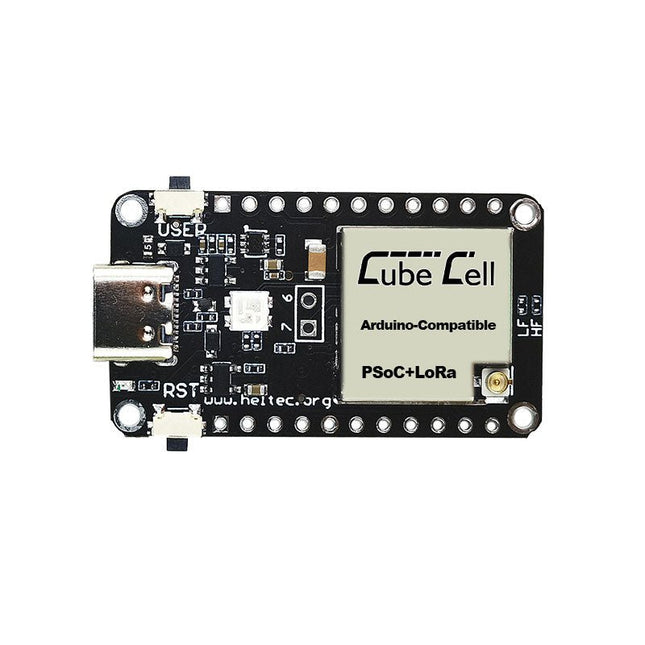
Heltec Automation CubeCell HTCC-AB01 (V2) LoRa Development Board (EU868)
The CubeCell series is designed primarily for LoRa/LoRaWAN node applications. Built on the ASR605x platform (ASR6501, ASR6502), these chips integrate the PSoC 4000 series MCU (ARM Cortex-M0+ Core) with the SX1262 module. The CubeCell series offers seamless Arduino compatibility, stable LoRaWAN protocol operation, and straightforward connectivity with lithium batteries and solar panels. The HTCC-AB01 (V2) is an upgraded version of the HTCC-AB01 board. Features Arduino compatible Based on ASR605x (ASR6501, ASR6502), those chips are already integrated the PSoC 4000 series MCU (ARM Cortex-M0+ Core) and SX1262 LoRaWAN 1.0.2 support Ultra low power design, 3.5 uA in deep sleep Onboard SH1.25-2 battery interface, integrated lithium battery management system (charge and discharge management, overcharge protection, battery power detection, USB/battery power automatic switching) Good impendence matching and long communication distance. Onboard solar energy management system, can directly connect with a 5.5~7 V solar panel Micro USB interface with complete ESD protection, short circuit protection, RF shielding, and other protection measures Integrated CP2102 USB to serial port chip, convenient for program downloading, debugging information printing Specifications Main Chip ASR6502 (48 MHz ARM Cortex-M0+ MCU) LoRa Chipset SX1262 Frequency 863~870 MHz Max. TX Power 21 ±1 dBm Max. Receiving Sensitivity −134 dBm Hardware Resource 1x UART1x SPI1x I²C1x SWD1x 12-bit ADC input8-channel DMA engine8x GPIO2x PWM Memory 128 Kb FLASH16 Kb SRAM Power consumption Deep Sleep 3.5 uA Interfaces 1x USB-C1x LoRa Antenna (IPEX 1.0)SH1.25; 11x 2x 2.54 Pin header1x (2x 2.54 Pin header) Solar Energy VS pin can be connected to 5.5~7 V solar panel Battery 3.7 V Lithium battery (power supply and charging) Operating temperature −20~70°C Dimensions 40.6 x 22.9 x 7.6 mm Included 1x CubeCell HTCC-AB01 (V2) Development Board 1x Antenna 1x 2x SH1.25 battery connector Downloads Datasheet Schematic Quick start GitHub
-
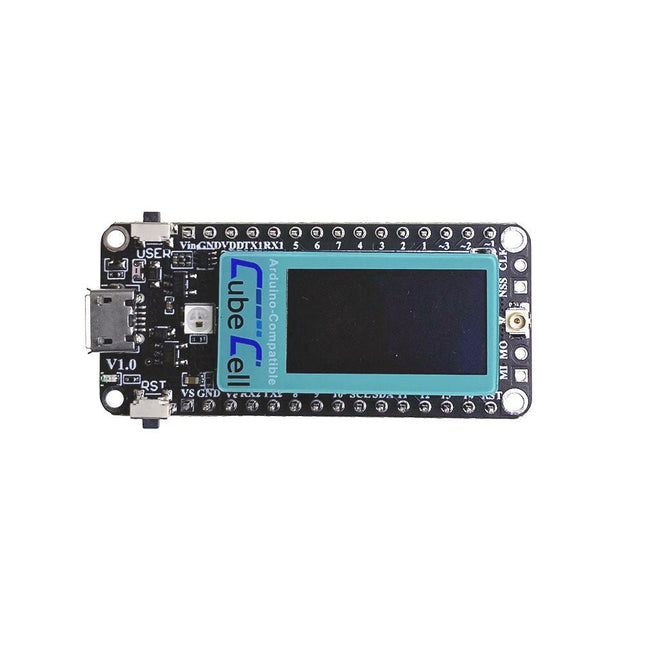
Heltec Automation CubeCell HTCC-AB02 LoRa Development Board (EU868)
The CubeCell series is designed primarily for LoRa/LoRaWAN node applications. Built on the ASR605x platform (ASR6501, ASR6502), these chips integrate the PSoC 4000 series MCU (ARM Cortex-M0+ Core) with the SX1262 module. The CubeCell series offers seamless Arduino compatibility, stable LoRaWAN protocol operation, and straightforward connectivity with lithium batteries and solar panels. The HTCC-AB02 is a developer-friendly board, ideal for quickly testing and validating communication solutions. Features Arduino compatible Based on ASR605x (ASR6501, ASR6502), those chips are already integrated the PSoC 4000 series MCU (ARM Cortex M0+ Core) and SX1262 LoRaWAN 1.0.2 support Ultra low power design, 3.5 uA in deep sleep Onboard SH1.25-2 battery interface, integrated lithium battery management system (charge and discharge management, overcharge protection, battery power detection, USB/battery power automatic switching) Good impendence matching and long communication distance Onboard solar energy management system, can directly connect with a 5.5~7 V solar panel Micro USB interface with complete ESD protection, short circuit protection, RF shielding, and other protection measures Integrated CP2102 USB to serial port chip, convenient for program downloading, debugging information printing Onboard 0.96-inch 128x64 dot matrix OLED display, which can be used to display debugging information, battery power, and other information Specifications Main Chip ASR6502 (48 MHz ARM Cortex-M0+ MCU) LoRa Chipset SX1262 Frequency 863~870 MHz Max. TX Power 22 ±1 dBm Max. Receiving Sensitivity −135 dBm Hardware Resource 2x UART1x SPI2x I²C1x SWD3x 12-bit ADC input8-channel DMA engine16x GPIO Memory 128 Kb FLASH16 Kb SRAM Power consumption Deep sleep 3.5 uA Interfaces 1x Micro USB1x LoRa Antenna (IPEX)2x (15x 2.54 Pin header) + 3x (2x 2.54 Pin header) Battery 3.7 V lithium battery (power supply and charging) Solar Energy VS pin can be connected to 5.5~7 V solar panel USB to Serial Chip CP2102 Display 0.96" OLED (128 x 64) Operating temperature −20~70°C Dimensions 51.9 x 25 x 8 mm Included 1x CubeCell HTCC-AB02 Development Board 1x Antenna 1x 2x SH1.25 battery connector Downloads Datasheet Schematic Quick start GitHub
-
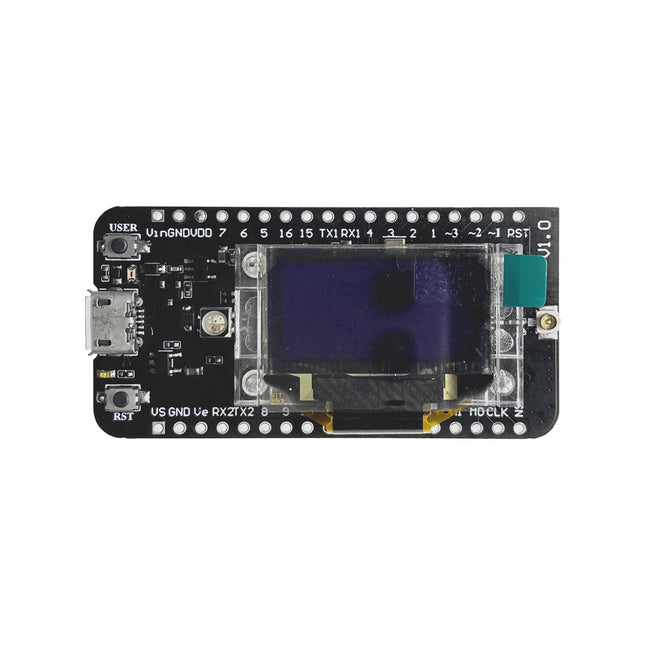
Heltec Automation CubeCell HTCC-AB02S LoRa Development Board with GPS (EU868)
The CubeCell series is designed primarily for LoRa/LoRaWAN node applications. Built on the ASR605x platform (ASR6501, ASR6502), these chips integrate the PSoC 4000 series MCU (ARM Cortex-M0+ Core) with the SX1262 module. The CubeCell series offers seamless Arduino compatibility, stable LoRaWAN protocol operation, and straightforward connectivity with lithium batteries and solar panels. The HTCC-AB02S is a developer-friendly board with an integrated AIR530Z GPS module, ideal for quickly testing and validating communication solutions. Features Arduino compatible Based on ASR605x (ASR6501, ASR6502), those chips are already integrated the PSoC 4000 series MCU (ARM Cortex M0+ Core) and SX1262 LoRaWAN 1.0.2 support Ultra low power design, 21 uA in deep sleep Onboard SH1.25-2 battery interface, integrated lithium battery management system (charge and discharge management, overcharge protection, battery power detection, USB/battery power automatic switching) Good impendence matching and long communication distance Onboard solar energy management system, can directly connect with a 5.5~7 V solar panel Micro USB interface with complete ESD protection, short circuit protection, RF shielding, and other protection measures Integrated CP2102 USB to serial port chip, convenient for program downloading, debugging information printing Onboard 0.96-inch 128x64 dot matrix OLED display, which can be used to display debugging information, battery power, and other information Using Air530 GPS module with GPS/Beidou Dual-mode position system support Specifications Main Chip ASR6502 (48 MHz ARM Cortex-M0+ MCU) LoRa Chipset SX1262 Frequency 863~870 MHz Max. TX Power 22 ±1 dBm Max. Receiving Sensitivity −135 dBm Hardware Resource 2x UART1x SPI2x I²C1x SWD3x 12-bit ADC input8-channel DMA engine16x GPIO Memory 128 Kb FLASH16 Kb SRAM Power consumption Deep sleep 21 uA Interfaces 1x Micro USB1x LoRa Antenna (IPEX)2x (15x 2.54 Pin header) + 3x (2x 2.54 Pin header) Battery 3.7 V lithium battery (power supply and charging) Solar Energy VS pin can be connected to 5.5~7 V solar panel USB to Serial Chip CP2102 Display 0.96" OLED (128 x 64) Operating temperature −20~70°C Dimensions 55.9 x 27.9 x 9.5 mm Included 1x CubeCell HTCC-AB02S Development Board 1x Antenna 1x 2x SH1.25 battery connector Downloads Datasheet Schematic GPS module (Manual) Quick start GitHub
€ 49,95€ 24,95
Leden identiek
-

Cytron Cytron Maker Line Sensor
Maker Line is een lijnsensor met 5 x IR sensoren array die in staat is om lijnen te volgen van 13 mm tot 30 mm breedte. De sensor calibratie is ook vereenvoudigd. Het is niet nodig om de potentiometer voor elke IR sensor aan te passen. U hoeft alleen maar de calibrate knop gedurende 2 seconden in te drukken om de calibratie modus te openen. Daarna moet u de sensoren over de lijn laten vegen, nogmaals op de knop drukken en u bent klaar om te gaan. De kalibratiegegevens worden opgeslagen in EEPROM en deze blijven intact, zelfs als de sensor is uitgeschakeld. Kalibratie hoeft dus maar één keer te worden uitgevoerd, tenzij de sensorhoogte, lijnkleur of achtergrondkleur is veranderd. Maker Line ondersteunt ook dubbele uitgangen: 5 x digitale uitgangen voor de status van elke sensor onafhankelijk, wat vergelijkbaar is met conventionele IR-sensor, maar u krijgt het voordeel van eenvoudige kalibratie, en ook een analoge uitgang, waar de spanning de lijnpositie vertegenwoordigt. De analoge uitgang biedt ook een hogere resolutie in vergelijking met afzonderlijke digitale uitgangen. Dit is vooral nuttig wanneer een hoge nauwkeurigheid vereist is bij het bouwen van een lijnvolgende robot met PID regeling. Kenmerken Bedrijfsspanning: DC 3,3 V en 5 V compatibel (met omgekeerde polariteitsbeveiliging) Aanbevolen lijndikte: 13 mm tot 30 mm Selecteerbare lijnkleur (licht of donker) Sensor afstand (hoogte): 4 mm tot 40 mm (Vcc = 5 V, zwarte lijn op wit oppervlak) Sensor Vernieuwingsfrequentie: 200 Hz Eenvoudig kalibratieproces Dubbele uitgangstypen: 5 x digitale uitgangen vertegenwoordigen elke IR-sensor staat, 1 x analoge uitgang vertegenwoordigt lijn positie. Ondersteunt een breed scala aan controllers, zoals Arduino, Raspberry Pi etc. Downloads Datasheet Tutorial: Een goedkope lijnvolgende robot bouwen
€ 14,95€ 7,50
Leden identiek
-
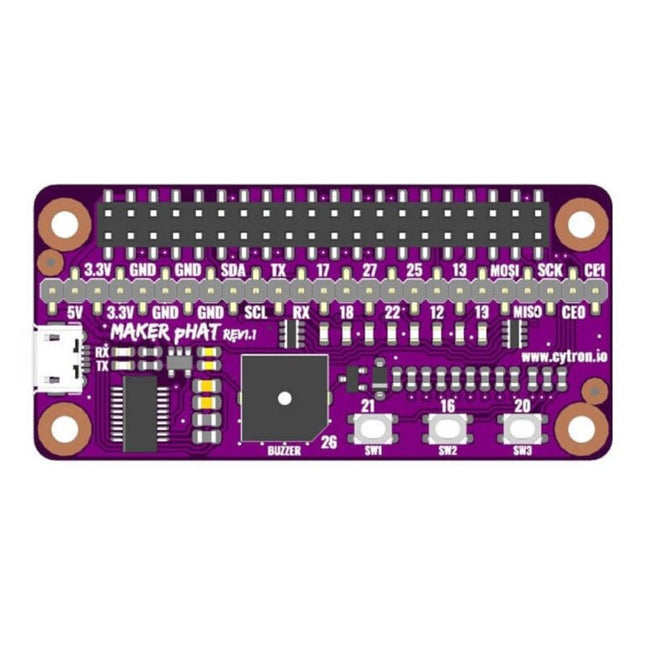
Cytron Cytron Maker pHAT voor Raspberry Pi
The Maker pHAT is the solution to the most common problems beginners face starting with Raspberry PI. Its intelligent and simple design makes it easy to attach to your Pi, and it helps you avoid all the tedious work of connection various other accessories. Additionally, the LEDs corresponding to each pin makes it extremely easy to see where a potential problem lies The Maker pHat has the same size as the Raspberry Pi Zero with all 4mounting holes aligned. However, it can be used with Raspberry Pi 3B, 3B+ and 3A+, by inserting a 2 x 20 stacking header. Kenmerken Raspberry Pi Zero size, stack perfectly on to Raspberry Pi Zero Compatible with standard size Raspberry Pi 3B / 3B+, medium size Raspberry Pi 3A+ and smaller size Raspberry Pi Zero / W / WH. Standard Raspberry Pi GPIO footprint. LED array for selected GPIO pins (GPIO 17, 18, 27, 22, 25, 12, 13, 19). 3x on board programmable push buttons (GPIO 21, 19 and 20, need to configure as input pull up). Onboard active buzzer (GPIO 26). Proper labels for all GPIOs, including SPI, UART, I2C, 5V, 3.3V, and GND. Utilize USB Micro-B socket for 5V input and USB to UART communication. USB serial facilitated by the FT231X Input voltage: USB 5 V, from a computer, power bank or a standard USB adapter.
€ 14,95€ 7,50
Leden identiek
-
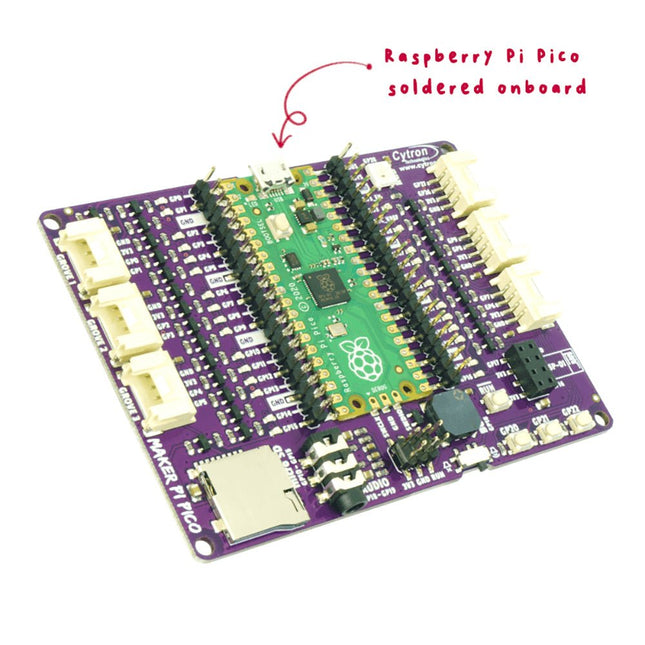
Cytron Cytron Maker Pi Pico (with pre-soldered Raspberry Pi Pico)
De Cytron Maker Pi Pico (met hierop een Raspberry Pi Pico RP2040 voorgesoldeerd) bevat de meest gewilde functies voor je Raspberry Pi Pico, en geeft je toegang tot alle GPIO-pinnen op twee 20-pins headers, met duidelijke labels.Elke GPIO is gekoppeld aan een LED-indicator voor het gemakkelijk testen van codes en het oplossen van problemen. De onderste laag van dit bord is zelfs voorzien van een uitgebreid pinout-diagram, dat de functie van elke pin laat zien.Kenmerken Meteen out-of-the-box aan de slag. Solderen niet nodig! Toegang tot alle pinnen van de Raspberry Pi Pico op twee 20-pins headers LED-indicatoren op alle GPIO-pinnen 3x programmeerbare drukknoppen (GP20-22) 1x RGB-LED – NeoPixel (GP28) 1x Piëzo zoemer (GP18) 1x 3,5 mm stereo audio jack (GP18-19) 1x Micro SD kaarthouder (GP10-15) 1x ESP-01 bus (GP16-17) 6x Grove poort Specificaties Core 32-bit ARM Cortex-M0+ CPU Klok 48 MHz, tot 133 MHz Flash grootte 2 MByte Q-SPI Flash Programmeertaal MicroPython, C++ Voedingsspanning 5 VDC via MicroUSB Alternative spanning 2-5 VDC via VSYS Pin (Pin 39) MCU spanning 3,3 VDC GPIO spanning 3,3 VDC USB interface USB 1.1 Device Host Programma laden MicroUSB, USB Mass Storage GPIO 26x Ingang/Uitgang ADC 3x 12-bits 500 ksps Temperatuursensor Ingebouwd, 12-bits UART 2x UART I²C 2x I²C SPI 2x SPI PWM 16x PWM Timer 1x Timer met 4 x Alarm Realtime counter 1x Realtime counter PIO 2x Programmeerbare high-speed I/O On-Board LED 1x Programmeerbare LED On-Board drukknop 1x BOOTSEL knop
€ 24,95€ 12,50
Leden identiek
-

Cytron Cytron Maker Pi Pico Mini W (with pre-soldered Raspberry Pi Pico W & preloaded CircuitPython)
Love the Cytron Maker Pi Pico (SKU 19706) but can't fit it into your project? Now there is the Cytron Maker Pi Pico Mini W. Powered by the awesome Raspberry Pi Pico W, it also inherited most of the useful features from its bigger sibling such as GPIO status LEDs, WS2812B Neopixel RGB LED, passive piezo buzzer, and not forget the user button and reset button.Features Powered by Raspberry Pi Pico W Single-cell LiPo connector with overcharge / over-discharge protection circuit, rechargeable via USB. 6x Status indicator LEDs for GPIOs 1x Passive piezo buzzer (Able to play musical tone or melody) 1x Reset button 1x User programmable button 1x RGB LEDs (WS2812B Neopixel) 3x Maker Ports, compatible with Qwiic, STEMMA QT, and Grove (via conversion cable) Support Arduino IDE, CircuitPython and MicroPython Dimension: 23.12 x 53.85 mm Included 1x Maker Pi Pico Mini W (pre-soldered Raspberry Pi Pico W with preloaded CircuitPython) 3x Grove to JST-SH (Qwiic / STEMMA QT) Cable Downloads Maker Pi Pico Mini Datasheet Maker Pi Pico Mini Schematic Maker Pi Pico Mini Pinout Diagram Official Raspberry Pi Pico Page Getting started with Raspberry Pi Pico CircuitPython for Raspberry Pi Pico Raspberry Pi Pico Datasheet RP2040 Datasheet Raspberry Pi Pico Python SDK Raspberry Pi Pico C/C++ SDK
€ 19,95€ 9,95
Leden identiek
-
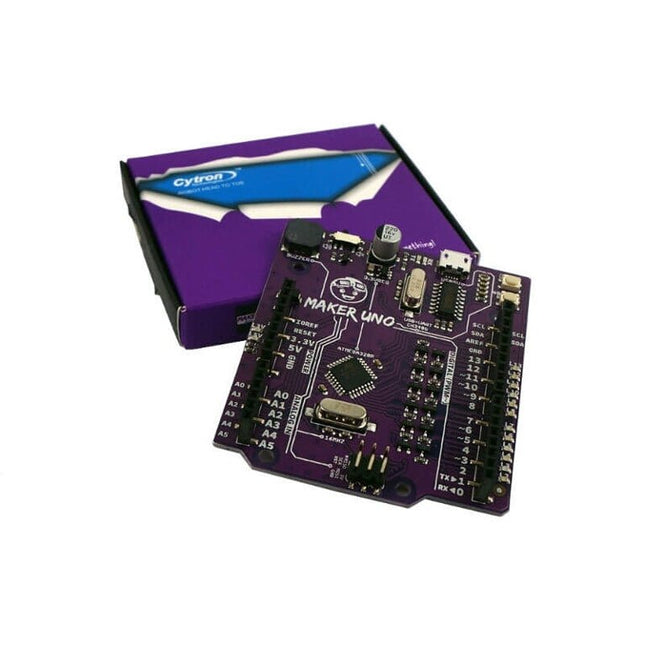
Cytron Cytron Maker Uno
Functies Piezoemer: Fungeert als een eenvoudige audio-uitgang Micro USB-poort Programmeerbare knop 12 x LED: Zorgt voor visuele output aan boord Specificaties Microcontroller ATmega328P Programmeer IDE Arduino IDE Bedrijfsspanning 5 V Digitale I/O 20 PWM 6 Analoge ingang 6 (10-bit) UART 1 SPI 1 I2C 1 Extern onderbreken 2 Flashgeheugen 32 KB SRAM 2 KB EEPROM / Data Flash 1 KB Kloksnelheid 16 MHz DC-stroom I/O-pen 20 mA Voeding Alleen USB DC stroom voor 5 V USB bron DC stroom voor 3,3 V 500 mA USB naar Seriële Chip CH340G Programmeerbare LED 12 bij digitale pin 2 tot 13 Programmeerbare Drukknop 1 op digitale pin 2 Piezoemer 1 op digitale pin 8 Arduino vs Maker Uno
€ 14,95
Leden € 13,46
-

Cytron Cytron Motion 2350 Pro Robotics-controller
De Cytron Motion 2350 Pro is een robuuste 4-kanaals DC-motordriver (3 A per kanaal, 3,6-16 V), ideaal voor het bouwen van krachtige robots, inclusief mecanumwielontwerpen. Het beschikt over 8-kanaals 5 V-servopoorten, 8-kanaals GPIO-breakouts, 3 Maker-poorten en een USB-host voor plug-and-play joystick/gamepad-ondersteuning. Aangedreven door Raspberry Pi Pico 2, integreert het naadloos met het Pico-ecosysteem en ondersteunt Python (MicroPython, CircuitPython), C/C++ en Arduino IDE. Het is vooraf geïnstalleerd met CircuitPython en wordt geleverd met een demoprogramma en snelle testknoppen voor onmiddellijk gebruik. Maak eenvoudig verbinding via USB-C en begin met verkennen! Inbegrepen 1x Cytron Motion 2350 Pro Robotics-controller 1x STEMMA QT/Qwiic JST SH 4-pins kabel met vrouwelijke aansluitingen (150 mm) 2x Grove naar JST-SH-kabel (200 mm) 1x Set siliconen bumpers 4x Bouwsteenfrictiepin 1x Mini-schroevendraaier
€ 29,95€ 14,95
Leden identiek
-

Cytron Cytron REKA:BIT – Robotica met micro:bit
Program your REKA:BIT with Microsoft MakeCode Editor. Just add REKA:BIT MakeCode Extension and you’re good to go. If you’re a beginner, you can start with the block programming mode; simply drag, drop and snap the coding blocks together. For more advanced users, you can easily switch into JavaScript or Python mode on MakeCode Editor for text-based programming. REKA:BIT possesses a lot of indicator LEDs to assist your coding and troubleshooting. It covers the IO pins connected to all six Grove ports and DC motor outputs from the co-processor. One is able to check his/her program and circuit connection easily by monitoring these LEDs. Besides, REKA:BIT also has a power on/off indicator, undervoltage, and overvoltage LEDs built-in to give appropriate warnings should there be any problem with the power input. REKA:BIT features a co-processor to handle multitasking more efficiently. Playing music while controlling up to 4x servo motors and 2x DC motors, animating micro:bit LED matrix, and even lighting up RGB LEDs in different colors, all at the same time, is not a problem for REKA:BIT. Kenmerken 2x DC motor terminals Built-in motor quick test buttons (no coding needed) 4x Servo motor ports 2x Neopixel RGB LEDs 6x Grove port (3.3 V) 3x Analog Input / Digital IO ports 2x Digital IO ports 1x I²C Interface DC jack for power input (3.6 - 6 VDC) ON/OFF switch Power on indicator Undervoltage (LOW) indicator & protection Over-voltage (HIGH) indicator & protection Dimensions: 10.4 x 72 x 15 mm Inbegrepen 1x REKA:BIT expansion board 1x USB power and data cable 1x 4xAA battery holder 1x Mini screwdriver 3x Grove to female header cable 2x Building block 1x9 lift arm 4x Building block friction pin Please note: micro:bit board not included
€ 22,95€ 11,50
Leden identiek
-
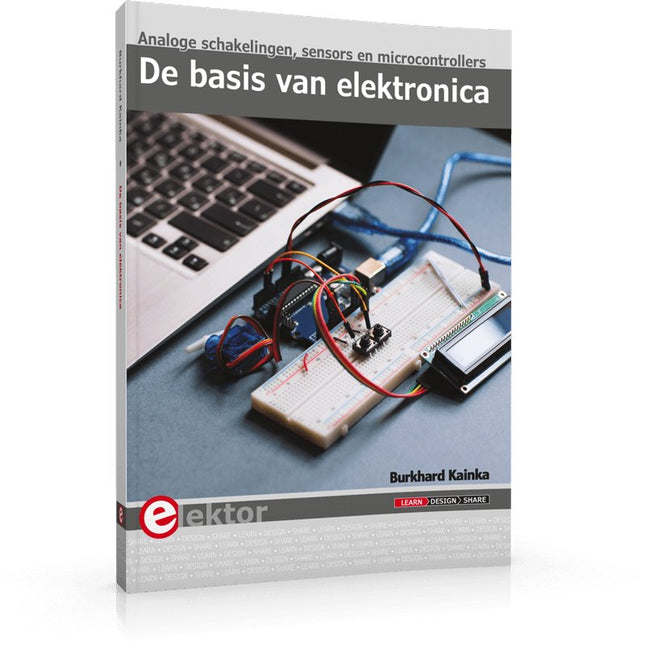
Elektor Publishing De basis van elektronica
Analoge schakelingen, sensors en microcontrollers Elektronica is spannend. Het is een hobby die zowel leuk als leerzaam is. Het stelt je in staat om thuis of op het werk nieuwe en nuttige vaardigheden te leren. Een ervaren elektronicus ontwerpt zijn eigen schakelingen, en brengt zijn projecten tot leven. Maar voordat je zover bent, moet je eerst de basis onder de knie krijgen. Daarom brengt dit boek een groot aantal inleidende artikelen samen die in het elektronicatijdschrift Elektor zijn gepubliceerd. Het is je metgezel bij het leerproces in de wereld van de elektronica. Het begint allemaal met analoge elektronica. Je zult de eenvoudigste componenten en circuits ontdekken om te begrijpen hoe ze werken, hoe ze op elkaar inwerken en de mogelijke problemen. De beste manier om vooruitgang te boeken is door echte experimenten uit te voeren, want theorie is niet genoeg. Dit boek begeleid je in een groot aantal praktische projecten voor beginners. Door ze te maken, doe je veel ervaring en kennis op. Het tweede deel van het boek neemt je mee in de wereld van de digitale elektronica. De auteur bespreekt het gebruik van microcontrollers. Taken die voorheen werden uitgevoerd door discrete componenten of conventionele geïntegreerde schakelingen worden nu uitgevoerd door microcontrollers. De programmeertaal BASCOM, maar ook platforms als Arduino, BBC micro:bit en andere, maken dit leerproces veel gemakkelijker. Dit boek beschrijft in detail vele toepassingen van microcontrollers, die betaalbaar zijn voor de beginner. Hier gaan programmeren en solderen hand in hand!
€ 39,95
Leden € 35,96
-

Elektor Digital De basis van elektronica (E-book)
Elektronica is spannend. Het is een hobby die zowel leuk als leerzaam is. Het stelt je in staat om thuis of op het werk nieuwe en nuttige vaardigheden te leren. Een ervaren elektronicus ontwerpt zijn eigen schakelingen, en brengt zijn projecten tot leven. Maar voordat je zover bent, moet je eerst de basis onder de knie krijgen. Daarom brengt dit boek een groot aantal inleidende artikelen samen die in het elektronicatijdschrift Elektor zijn gepubliceerd. Het is je metgezel bij het leerproces in de wereld van de elektronica. Het begint allemaal met analoge elektronica. Je zult de eenvoudigste componenten en circuits ontdekken om te begrijpen hoe ze werken, hoe ze op elkaar inwerken en de mogelijke problemen. De beste manier om vooruitgang te boeken is door echte experimenten uit te voeren, want theorie is niet genoeg. Dit boek begeleid je in een groot aantal praktische projecten voor beginners. Door ze te maken, doe je veel ervaring en kennis op. Het tweede deel van het boek neemt je mee in de wereld van de digitale elektronica. De auteur bespreekt het gebruik van microcontrollers. Taken die voorheen werden uitgevoerd door discrete componenten of conventionele geïntegreerde schakelingen worden nu uitgevoerd door microcontrollers. De programmeertaal BASCOM, maar ook platforms als Arduino, BBC micro:bit en andere, maken dit leerproces veel gemakkelijker. Dit boek beschrijft in detail vele toepassingen van microcontrollers, die betaalbaar zijn voor de beginner. Hier gaan programmeren en solderen hand in hand!
€ 32,95
Leden € 26,36
-
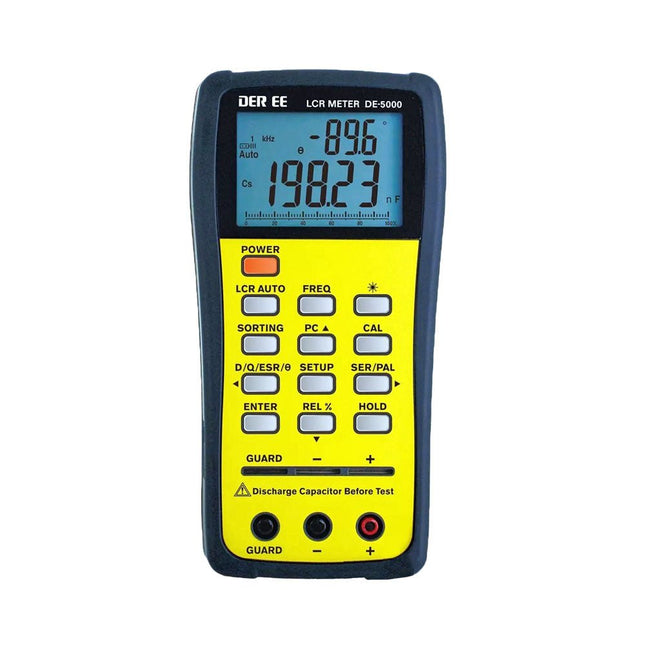
DER EE DER EE DE-5000 LCR-meter (100 kHz)
De DE-5000 is een slimme, zeer nauwkeurige, flexibele en gebruiksvriendelijke draagbare LCR-meter. Hij beschikt over automatische LCR-check, 4-draads Kelvin-meting, een backlit display met 19999 / 1999 counts, meerdere meetmodi, en instelbare testfrequenties (100 Hz, 120 Hz, 1 kHz, 10 kHz of 100 kHz). De DE-5000 LCR-meter is een handig hulpmiddel voor ingenieurs of technici. Kenmerken Automatische L.C.R. check Ls/Lp/Cs/Cp/Rs/Rp/DCR met D/Q/?/ESR meting 4-draads Kelvin-meting 19999 / 1999 counts display Achtergrondverlichting Relatieve modus Serieel/parallel modus Componenten sorteerfunctie Indicatie bij 'accu bijna leeg' Automatische power-off Specificaties Test frequentie 100 Hz / 120 Hz / 1 kHz / 10 kHz / 100 kHz Weerstand bereik 20.000 ? – 200,0 M? DCR bereik 200.00 ? – 200.0 M? Capaciteit bereik 200.00 pF – 20.00 mF Inductie bereik 20.000 ?H – 2.000 KH Display (backlit LCD-scherm) 19999 / 1999 counts Instelbare tolerantie ±0,25%, ±0,5%, ±1%, ±2%, ±5%, ±10%, ±20% Voeding 9 V accu Afmetingen 188 x 95 x 52 mm Gewicht 350 g (exclusief accu) Inbegrepen DE-5000 LCR-meter Meetconnector met krokodillenklemmen (TL-21) AC/DC-adapter Guard kabeltje (TL-23) TL-22 SMD pincetten 9 V accu Draagtas Handleiding Downloads Datasheet
-

DER EE DER EE DE-5050 Isolatietester
De DE-5050 isolatietester is een veelzijdig instrument dat is ontworpen voor het meten van isolatieweerstand, lage weerstand en AC/DC-spanning. De gebruiksvriendelijke eigenschappen maken hem geschikt voor diverse elektrische testtoepassingen. Kenmerken Biedt vijf selecteerbare testspanningen voor verschillende testvereisten Detecteert automatisch de AC/DC-spanning en geeft de frequentie weer wanneer de AC-spanning 10 V overschrijdt Slaat maximaal 100 sets testresultaten op met datum en tijd Wordt automatisch uitgeschakeld na 10 minuten inactiviteit Uitgerust met een display met achtergrondverlichting Maakt nulaanpassing mogelijk voor metingen van lage weerstand Automatische berekening en weergave van de Dielectric Absorption Ratio (DAR) en Polarization Index (PI) tijdens de isolatieweerstandstest Specificaties Testspanningen 50 V, 100 V/125 V, 250 V, 500 V, 1000 V Isolatieweerstandsbereik Tot 20 GΩ bij 500 VTot 40 GΩ bij 1000 V Nauwkeurigheid van spanningsmeting ±1%rdg±4dgt (sinus wave) Afmetingen 160 x 100 x 46 mm Gewicht 380 g (exclusief batterijen) Downloads Datasheet
-
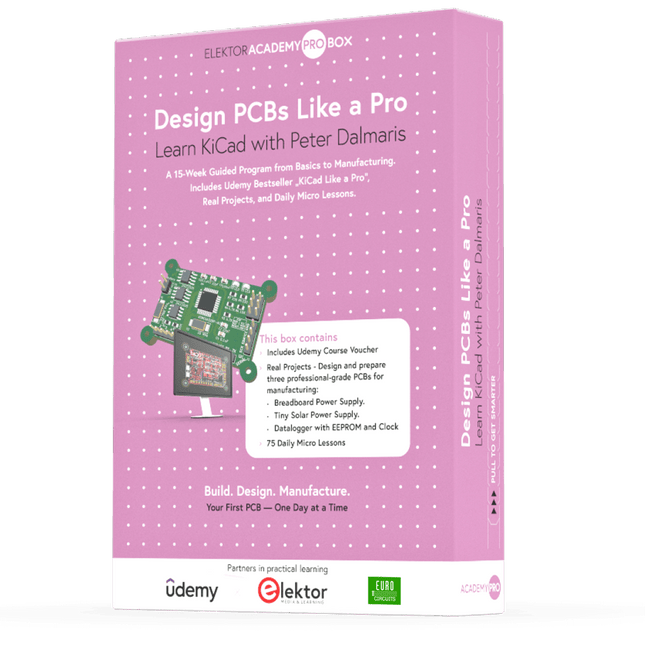
Elektor Academy Pro Design PCBs Like a Pro
Leer KiCad met Peter Dalmaris De Academy Pro Box "Design PCBs like a Pro" biedt een compleet, gestructureerd trainingsprogramma in PCB-ontwerp, dat online leren combineert met praktische toepassing. Gebaseerd op de KiCad-cursus van Peter Dalmaris, integreert het 15 weken durende programma videolessen, gedrukt materiaal (2 boeken) en praktijkgerichte projecten om ervoor te zorgen dat deelnemers niet alleen de theorie begrijpen, maar ook de vaardigheden ontwikkelen om deze in de praktijk toe te passen. In tegenstelling tot standaardcursussen biedt de Academy Pro Box een begeleid leertraject met wekelijkse mijlpalen en fysieke componenten om werkende PCB's te ontwerpen, testen en produceren. Deze aanpak ondersteunt een diepgaandere leerervaring en een betere kennisbehoud. De box is ideaal voor ingenieurs, studenten en professionals die praktische expertise in PCB-ontwerp willen ontwikkelen met behulp van open-sourcetools. Met de extra optie om hun afstudeerproject te laten produceren, ronden deelnemers het programma af met echte resultaten – klaar voor gebruik, testen of verdere ontwikkeling. Learn by doing Vaardigheden ontwikkelen. Echte printplaten ontwerpen. Gerbers genereren. Je eerste bestelling plaatsen. Dit is niet zomaar een cursus – het is een compleet projecttraject van idee tot product. Wat u leert/ontvangt Werkkennis van de tools van KiCad Vertrouwen in het ontwerpen van uw eigen printplaten (PCB’s) Een volledig produceerbare printplaat – door u zelf gemaakt Wat zit er in de doos (cursus)? Beide delen van "KiCad Like a Pro" (t.w.v. € 105) Vol 1: Fundamentals and Projects Vol 2: Advanced Projects and Recipes Couponcode voor deelname aan de bestseller KiCad 9 online cursus van Peter Dalmaris op Udemy, met meer dan 20 uur aan videotraining. U voltooit drie volledige ontwerpprojecten: Breadboard voeding Kleine zonne-energie voeding Datalogger met EEPROM en klok Voucher van Eurocircuits voor de productie van printplaten (t.w.v. € 85 excl. BTW) Leermateriaal (van deze box/cursus) 15-weken leerprogramma ▶ Klik hier om te openen Week 1: Setup, Fundamentals, and First Steps in PCB Design Week 2: Starting Your First PCB Project – Schematic Capture Week 3: PCB Layout – From Netlist to Board Design Week 4: Design Principles, Libraries, and Workflow Week 5: Your First Real-World PCB Project Week 6: Custom Libraries – Symbols, Footprints, and Workflow Week 7: Advanced Tools – Net Classes, Rules, Zones, Routing Week 8: Manufacturing Files, BOMs, and PCB Ordering Week 9: Advanced Finishing Techniques – Graphics, Refinement, and Production Quality Week 10: Tiny Solar Power Supply – From Schematic to Layout Week 11: Tiny Solar Power Supply – PCB Layout and Production Prep Week 12: ESP32 Clone Project – Schematic Design and Layout Prep Week 13: ESP32 Clone – PCB Layout and Manufacturing Prep Week 14: Final Improvements and Advanced Features Week 15: Productivity Tools, Simulation, and Automation KiCad-cursus met 18 lessen op Udemy (door Peter Dalmaris) ▶ Klik hier om te openen Introduction Getting started with PCB design Getting started with KiCad Project: A hands-on tour of KiCad (Schematic Design) Project: A hands-on tour of KiCad (Layout) Design principles and PCB terms Design workflow and considerations Fundamental KiCad how-to: Symbols and Eeschema Fundamental KiCad how-to: Footprints and Pcbnew Project: Design a simple breadboard power supply PCB Project: Tiny Solar Power Supply Project: MCU datalogger with build-in 512K EEPROM and clock Recipes KiCad 9 new features and improvements Legacy (from previous versions of KiCad) KiCad 7 update (Legacy) (Legacy) Gettings started with KiCad Bonus lecture Over de auteur Dr. Peter Dalmaris, PhD, is docent, elektrotechnisch ingenieur en maker. Hij is maker van online videocursussen over doe-het-zelf-elektronica en auteur van diverse technische boeken. Sinds 2013 is Peter Chief Tech Explorer bij Tech Explorations, het bedrijf dat hij oprichtte in Sydney (Australië). Zijn missie is om technologie te verkennen en de wereld te helpen opleiden. Wat is Elektor Academy Pro? Elektor Academy Pro biedt gespecialiseerde leeroplossingen voor professionals, engineeringteams en technische experts in de elektronica- en embedded systemenindustrie. Het stelt zowel individuen als organisaties in staat hun praktijkkennis te verdiepen, vaardigheden te versterken en voorop te blijven lopen met hoogwaardige content en praktische trainingstools. Van praktijkgerichte projecten en cursussen onder leiding van experts tot diepgaande technische inzichten – Elektor ondersteunt ingenieurs bij het aanpakken van de actuele uitdagingen binnen elektronica en embedded systemen. Ons educatieve aanbod bestaat uit Academy-boeken, Pro Boxes, webinars, conferenties en branchespecifieke B2B-magazines – allemaal ontwikkeld met het oog op professionele groei. Of u nu ingenieur, R&D-specialist of technisch beslisser bent: Elektor Academy Pro slaat de brug tussen theorie en praktijk, helpt u nieuwe technologieën te beheersen en stimuleert innovatie binnen uw organisatie.
€ 199,95€ 164,95
Leden identiek
-

Elektor Digital Design your own Embedded Linux Control Centre (E-book)
This book is all about building your own DIY home control system. It presents two innovative ways to assemble such a system: By recycling old PC hardware – possibly extending the life of an old PC, or by using Raspberry Pi. In both cases, the main system outlined in this book will consist of a computer platform, a wireless mains outlet, a controller and a USB webcam – All linked together by Linux. By using the Raspberry Pi in conjunction with Arduino (used as an advanced I/O system board), it is possible to construct a small, compact, embedded control system offering enhanced capacity for USB integration, webcams, thermal monitoring and communication with the outside world. The experience required to undertake the projects within this book are minimal exposure to PC hardware and software, the ability to surf the internet, burn a CD-ROM and assemble a small PCB.
€ 34,95
Leden € 27,96
-

Elektor Digital E-Book: Designing Tube Amplifiers EN ANGLAIS
This book focuses more on practical aspects than on theory, and it has an contemplative nature, as though the author were viewing amplifiers from above. Knowledge elements are integrated and placed in the context of a broad overview. Even now tube amplifiers still sound great perhaps better than ever before. In part that is because we now have access to modern components such as toroidal output transformers, extremely high-quality resistors and capacitors, and many sorts of wire with good acoustic properties. Modern audio sources, such as CD players, and the latest top-end loudspeakers also enable us to appreciate how well tube amplifiers reproduce music even better than before. This new book from Menno van der Veen looks at tube amplifiers from more than just a theoretical perspective. It focuses primarily on the design phase, where decisions must be taken with regard to the purpose and requirements of the amplifier, and it addresses the following questions: How do these aspects relate to subjective and objective criteria? Which circuits sound the best, and why? If you want to develop and market an amplifier, what problems should you expect? What are the significance and meaning of measurements? Are they still meaningful, or have they lost their relevance? Thanks to the enormous processing power of computers, we can now measure more details than ever before. How can these new methods be applied to tube amplifiers? Previously it was sufficient to measure the frequency range, power and distortion of an amplifier in order to characterize the amplifier. Are these measurements still sufficient, or should we start measuring according to how we hear, using real music signals instead of waveforms from signal generators? The author sketches a future where amplifier measurements that conform to our sense of hearing enable us to arrive at new insights. This book focuses more on practical aspects than on theory, and it has an contemplative nature, as though the author were viewing amplifiers from above. Knowledge elements are integrated and placed in the context of a broad overview.
€ 29,95
Leden € 23,96
-

Zhongdi Desoldeerstiftenset voor ZD-modellen
Deze set bevat 3 desoldeerstiften voor digitale desoldeerstations zoals ZD-915 of ZD-8965. Inbegrepen 1x Desoldeerstift N5-1 (0.8 mm) 1x Desoldeerstift N5-2 (1.0 mm) 1x Desoldeerstift N5-3 (1.3 mm)
€ 9,95
Leden € 8,96























